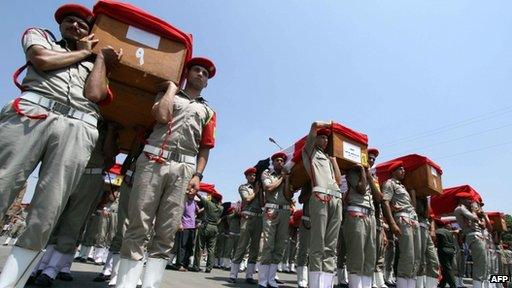Sinai raid could be start of a new bloody chapter
- Published
- comments

An attack in the Sinai peninsula on Sunday left 16 Egyptian soldiers dead
For many months Egyptian government control of the Sinai Peninsula has been tenuous at best.
The dangers of allowing ungoverned space, where militant groups have launched attacks on neighbouring Israel, ought to have been obvious to anybody in Cairo, but it was only the killing of 16 of their border guards on Sunday that finally prompted action.
The inhabitants of the Sinai Peninsula, notably some of its Bedouin tribes, are a heavily armed force that, it would seem, the military rulers of Egypt who had recently stood down were reluctant to challenge.
Now, in one of those bitter paradoxes of power in the Middle East, it has fallen to Mohammed Morsi, the recently elected president from the Muslim Brotherhood to clamp down on militants who claim Islamic legitimacy for their attacks.
It might be argued that Mr Morsi is the ideal man to take these wayward tribes in hand - since he has both a democratic mandate and some degree of backing from Egypt's religious establishment.
There is also a good deal of cynicism in Cairo about the tribes' professed religious motivations, since they are also widely believed to be involved in smuggling of drugs, weapons, and people.
Even so, Tuesday's raid on Touma, close to the Gaza Strip on the Mediterranean Sea, may indicate the opening of a bloody new chapter for Sinai. The raid, in which helicopters fired missiles into the township, had an aspect of communal punishment about it, or reprisal for Sunday's loss of border guards.
Inevitably there will be some who want revenge against the security forces. Since the armed bands on the peninsula are thought to possess hundreds of light weapons, as well as technicals (pick-up trucks mounting heavy machine guns), and multiple rocket launchers they have considerable ability to cause trouble.
The bombing of several hotels in Sharm el-Sheikh in 2005 claimed 84 lives was blamed by security officials on elements within the same Bedouin tribes, claiming ties with al-Qaeda.
It underlines the degree to which the country's Red Sea tourist industry is vulnerable to reprisals.
More recently the Israelis have accused the same groups of several deadly attacks along their border with Egypt. These created great tension in an area that had been peaceful for decades, and prompted the Israelis to start building a barrier through the desert in an attempt to prevent more infiltration.
Today the Israelis have reacted with satisfaction to the new security crackdown, and have given their agreement to military reinforcements going into Sinai (as it required under the 1979 peace treaty between the two countries that sought to de-militarise the peninsula).
Mr Morsi meanwhile faces the accusation that has been used in the past against those who have taken similar measures, of acting as Israel's policeman.
The shooting of so many Egyptian soldiers at the weekend has allowed the president to present this action as a response to a challenge to national authority rather than an attack on Israel.
But the scope both for serious escalation in this violence and for political difficulties for the new president will make the Sinai Peninsula a key place to watch in coming months.